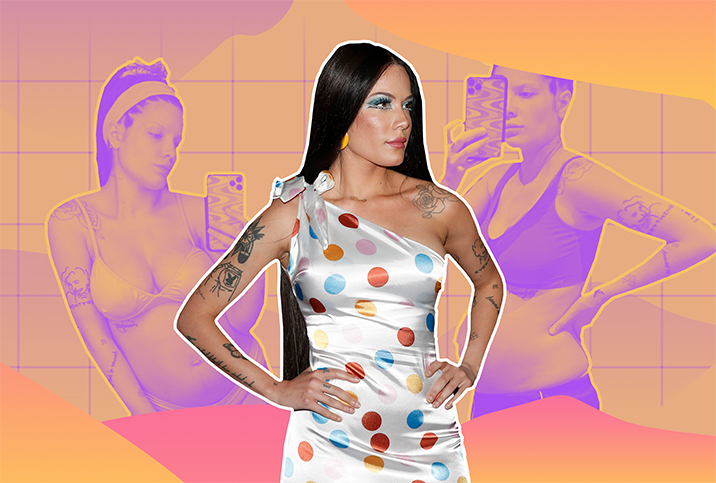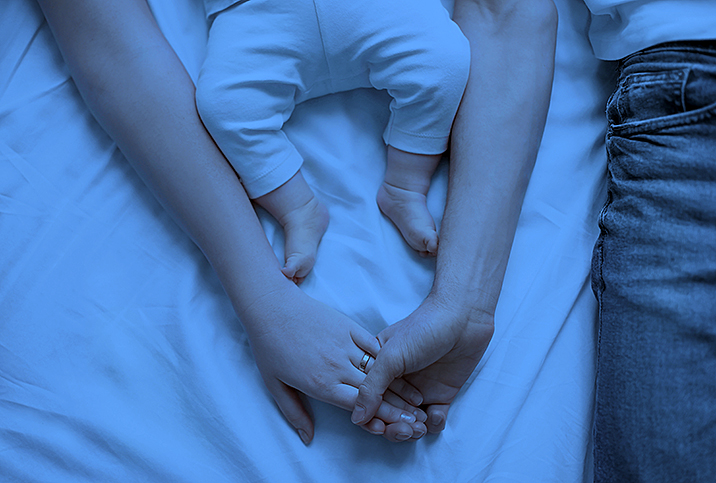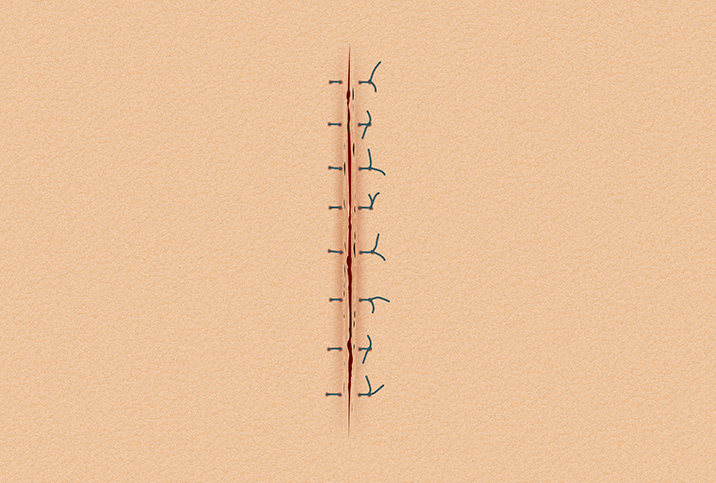No Tucking, Hiding or Shaming: All Postpartum Bodies Are Sexy

I arrived home from the hospital in May 2021 with my fourth son and sat down to nurse him, balancing pelvic ice packs with lower back heating pads, an adult diaper, one breast infected with mastitis and three other young sons eagerly bouncing around wanting to meet him. The baby finally settled in on my bloated belly, which had until recently housed his 10-pound, very overdue self. I went to open my phone. Then I stopped.
Where on the internet, I thought, would there even be anything worth seeing in my present state? I had come to fully resent the "bounce back" culture still creeping up in comments, edited photos and hashtags on all my social media. Even just a few years ago, postpartum parents were inundated with messages that they could and should return to their previous state, shrinking their bellies quickly, dropping that baby weight, and tightening loose skin that held their child for almost a year, among other issues. Since then, anti-bounce-back culture movements have made progress toward helping women accept their new bodies, and focus on health rather than an unattainable postpartum beauty standard.
But there's still much work to be done
Instagram and Facebook posts that mirrored my current state were few and far between. The fitness influencers I followed were itching to get running just weeks postpartum. Meanwhile, in my own reality, I was struggling to pull on pants that were the next size up. Fragile, vulnerable, yet somehow having done one of the most powerful things a woman can do, I chose at that moment to not open my phone.
As the days crept on, I realized I couldn't avoid society forever. I'd recently purchased my first nursing shirt from a brand called Latched Mama, which specializes in accessible yet discreet items for nursing parents, and happened upon an online community of women around the country in my exact same situation.
Founder Melissa Wirt, a Midlothian, Virginia, mom, hosts weekly Facebook lives, building her community through followers in her Facebook group Latched Mama Love, and hosts a podcast covering postpartum issues. An entire additional community of postpartum moms spiraled off from there in buy-sell-trade groups. In these groups, such as Latched Mama B/S/T and Latched Mama B/S/T+VIP Chat, among others, customers support each other through compliments and encouragement, swap clothes that aren't their size anymore and pose for "fashion shows," posting pictures of their clothes so others can help them find a flattering fit.
I'd never thought of my postpartum body as "hot," but here these women were, referring to each other as just that. The groups range from 8,000 to more than 13,000 members each, some of the Facebook lives have 290,000 views each and the podcast has 40,000 downloads.
Their bellies looked like mine. Their eyes drooped with the same two-hours-of-sleep vibe. Their upper arms, where I carry weight throughout my postpartum year of nursing, were fluffier than normal. None of them looked like any of the Instagram influencers I follow, even the well-intentioned ones inspiring us to succeed with #Fitpregnancy and #postpartumbody posts. I breathed a sigh of relief, and started to scroll. I'd somehow, miraculously, found the corner of the internet where people were like me.
Social media spaces and their negative impact
According to the CDC, 1 in 5 women suffers from postpartum depression (a notably higher 1 in 4 in the Black demographic). Internet communities matter not just for these parents, but for everyone postpartum.
In a 2021 study published in BMC Pregnancy and Childbirth, researchers report, "Information coupled with cultural and social pressures may make women feel unattractive, dissatisfied with their body, anxious, depressed, and stressed." It's important to note that as new parents navigate Cesarean section scars, stretch marks, postpartum acne and hair loss, body image struggles can be about much more than just weight.
Another 2016 study published in JMIR Mental Health shows positive social networking sites led to lower levels of depression and anxiety, while negative ones increased them. In groups like the Latched Mama's, filter-free, makeup-free, unedited images are not only welcome, they are the norm.
Sarah K. Price, Ph.D., associate dean for faculty development, and professor in the online master of the social work program at Virginia Commonwealth University, said postpartum bodies may never look like pre-pregnancy bodies, and that the recovery process takes years. "Yet, social media portrayals of women's bodies may make it seem as if everything miraculously realigns in the hours since giving birth. Sometimes, the bodies portrayed in media holding newborns aren't really even 'postpartum' at all, but from much later down the road, or using a not-even-postpartum model as a stand-in."
Changing perceptions of postpartum bodies
When Wirt brought her second baby home, she was surprised at the difficulty of postpartum life, including her body image. "I was aware of my privilege, the support and education I had, and still found it hard. Social media was a big aspect of it. I felt myself comparing my journey to others, wondering if I was doing things correctly. I wanted an outlet," she said.
Pre-pandemic, when Wirt started the company, she'd load her kids in her minivan and travel to other new moms' homes. "I'd hold their babies, listen to their birth stories, and they'd try on clothes. The community was always there." She said she believes they have created the most supportive mom community on the internet. "Watching women build a community based on these ideals that then spill over to other topics has truly been our greatest achievement as a brand."
Women in a range of sizes see their own image not only reflected in others, but also celebrated for what it can do and is doing—namely, nurturing their babies—rather than for how quickly it bounces back. The group reflects the mindset of other body-positive "momfluencers" and celebrities like The Birds Papaya, Halsey and Kristina Zias, and embraces hashtags like #cancelsnapbackculture, #honormycurves and #daretowear.
Wirt's stance against bounce-back culture is another reason mothers are drawn to positive internet spaces. She claps back at postpartum brands that won't take a stand: "You can't have it both ways—you can't say, 'We're here for you on the bad days and we get it' and never show the 'bad days' or chaos, and always present a polished perfect image. We have moms managing each major aspect of our operation, and we don't hide that the 'hot mess' days and weeks happen."
Community is a lifeline
Jena Newman, from Macon, Georgia, a mid-20s mom of one, said that beyond clothing, she found encouragement, lactation support and uplifting stories in online communities. She said it's powerful to be "able to feel connected to a virtual community of women that were just doing the damn thing." Online spaces worked to replace in-person community during her pandemic pregnancy, which she calls "isolating." It's the only place she was comfortable enough to share her breastfeeding photo session, as her family members "just 'don't get it.'" She credits the community with giving her relief to settle back into feeling herself.
Gwen Matthews, 35, a Maine mom of one, said it matters "to have other people be kind and positive in a world where 'mom bodies' and plus-sized bodies are often looked down on."
What I've learned from discovering this corner of the internet is that social media might still not find the postpartum mom bod to be that sexy, but they don't write the definition. Moms do.


















